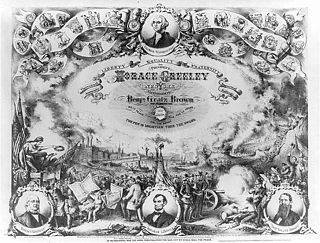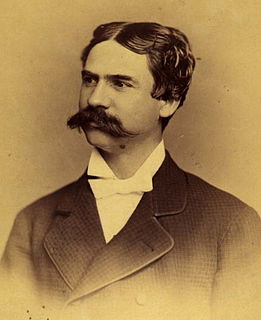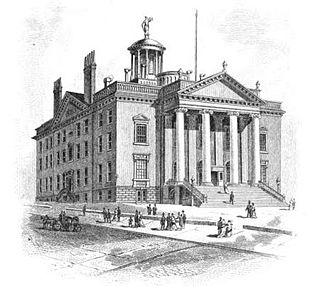
The United States presidential election of 1872 was the 22nd quadrennial presidential election, held on Tuesday, November 5, 1872. Despite a split in the Republican Party, incumbent President Ulysses S. Grant defeated Liberal Republican nominee Horace Greeley. The election is notable for being the only presidential election in which a major party nominee died during the election process.
The Radical Republicans were a faction of American politicians within the Republican Party of the United States from around 1854 until the end of Reconstruction in 1877. They called themselves "Radicals" with a sense of a complete permanent eradication of slavery and secessionism, without compromise. They were opposed during the War by the moderate Republicans, by the conservative Republicans, and by the pro-slavery and anti-Reconstruction Democratic Party as well as by conservatives in the South and liberals in the North during Reconstruction. Radicals led efforts after the war to establish civil rights for former slaves and fully implement emancipation. After weaker measures in 1866 resulted in violence against former slaves in the rebel states, Radicals pushed the Fourteenth Amendment and statutory protections through Congress. They disfavored allowing ex-Confederates officers to retake political power in the South, and emphasized equality, civil rights and voting rights for the "freedpeople", i.e. people who had been enslaved by state slavery laws within the United States.

Benjamin Gratz Brown was an American politician. He was a Senator, the 20th Governor of Missouri, and the Liberal Republican and Democratic Party vice presidential candidate in the presidential election of 1872.

The Liberal Republican Party of the United States was an American political party that was organized in May 1872 to oppose the reelection of President Ulysses S. Grant and his Radical Republican supporters in the presidential election of 1872. The party emerged in Missouri under the leadership of Senator Carl Schurz and soon attracted other opponents of Grant. The party opposed Grant's Reconstruction policies and sought civil service reform. It lost in a landslide and disappeared after the 1872 election.

Elections to the United States House of Representatives were held in 1872 and 1873 for representatives to the 43rd Congress, coinciding with the re-election of President Ulysses S. Grant.

John Marshall Hamilton was the 18th Governor of Illinois, serving from 1883 to 1885. Born in Union County, Ohio, Hamilton became interested in politics at a young age, joining the Wide Awakes when he was thirteen and the Union Army four years later. After graduating from Ohio Wesleyan University he studied law and was admitted to the bar. A notable attorney in Bloomington, Illinois, Hamilton was elected to the Illinois Senate in 1876. He served there until 1881, when he was elected Lieutenant Governor of Illinois on a ticket with Shelby Moore Cullom. When Cullom resigned after election to the United States Senate, Hamilton became Governor of Illinois. He was not selected as a candidate for re-election, but did serve that year as a delegate to the 1884 Republican National Convention. He spent the rest of his life as an attorney in Chicago, where he died in 1905.

Henry Clay Warmoth was an American attorney, Civil War officer in the Union Army, who was elected governor and state representative of Louisiana. A Republican, he was 26 years old when elected as 23rd Governor of Louisiana, one of the youngest governors elected in United States history. He served during the early Reconstruction Era, from 1868 to 1872.

The 1872 New York state election was held on November 5, 1872, to elect the Governor, the Lieutenant Governor, a Canal Commissioner, an Inspector of State Prisons and a U.S. Representative-at-large, as well as all members of the New York State Assembly.
Illinois is a Democratic stronghold in presidential elections and one of the three largest Democratic states in the nation alongside California and New York. It is one of the most Democratic states in the nation with all state executive offices and both state legislative branches held by Democrats. For most of its history, Illinois was widely considered to be a swing state, voting for the winner of all but two presidential elections in the 20th century. Political party strength in Illinois is highly dependent upon Cook County, and the state's reputation as a blue state rests upon the fact that the majority of its population and political power is concentrated in Chicago, Cook County, and the Chicago metropolitan area. Outside of Chicago, the suburban collar counties continue trending Democratic while downstate Illinois can be considered more conservative with some moderate regions.
The 1873 United States Senate election in New York was held on January 21, 1873, by the New York State Legislature to elect a U.S. Senator to represent the State of New York in the United States Senate.
The United States Senate elections of 1872 and 1873 were elections which had the Republican Party, while still retaining a commanding majority, lose two seats in the United States Senate. By the beginning of the Congress, however, they'd lost three more: two as defections to the Liberal Republican Party, and one a resignation of Henry Wilson to become U.S. Vice President. These elections also coincided with President Ulysses S. Grant's easy re-election.

The 96th New York State Legislature, consisting of the New York State Senate and the New York State Assembly, met from January 7 to May 30, 1873, during the first year of John A. Dix's governorship, in Albany.

The Illinois gubernatorial election of 1864 was the thirteenth election for this office and took place during the American Civil War. Republican governor Richard Yates did not run for re-election, but was instead elected to serve in the United States Senate. Major General Richard J. Oglesby resigned his commission to run as the Republican nominee. Congressman James Carroll Robinson was the Democratic nominee. At this time in Illinois history the Lieutenant Governor was elected on a separate ballot from the governor. This would remain the case until the adoption of the 1970 constitution.

The Illinois gubernatorial election of 1868 was the fourteenth election for this office. Republican nonimee, John M. Palmer defeated the Democratic nominee John R. Eden.

John Early was a Canadian American politician. Coming to Rockford, Illinois to practice carpentry, Early rose to become an agent for the New England Mutual Life Insurance Company. A staunch abolitionist, Early was an early supporter of the Republican Party and was voted to the Illinois Senate on the ticket four times. During one of these terms, he was elected President of the Illinois Senate, thus acting Lieutenant Governor of Illinois. Early died before his fourth term was completed.

The 1872 United States elections were held on November 5, electing the members of the 43rd United States Congress. The election took place during the Third Party System. The election took place during the Reconstruction Era, and many Southerners were barred from voting. Despite a split in the party, the Republicans retained control of the presidency and both houses of Congress.
George H. Harlow was an American politician. Born in New York, he was originally a student of carpentry and architecture. He entered the mercantile business soon after he moved to Pekin, Illinois. In 1860, he was elected clerk of the circuit court, then co-founded a Union League of America chapter, later serving at the state level of the organization. Harlow was the personal secretary to Governor Richard J. Oglesby and oversaw Camp Butler starting in 1864. He was elected assistant Illinois Secretary of State for four years starting in 1868, then was the secretary from 1872 to 1880. After his terms expired, he traded commodities in Chicago.

















